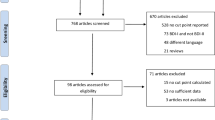Abstract
Purpose
To evaluate resilience in severe mental disorders and correlate it with clinical measures and quality of life.
Methods
Resilience (Resilience Scale, RS) and quality of life (WHOQOL-BREF questionnaire) were prospectively evaluated in a sample of 384 hospitalized patients diagnosed with severe mental disorders (depression, bipolar disorder and schizophrenia). Clinical outcomes were measured using the Global Assessment of Functioning Scale (GAF), Clinical Global Impression (CGI), Cumulative Illness Rating Scale (CIRS), Hamilton Scale-Depression (HAM-D), Young Mania Rating Scale (YMRS), and Brief Psychiatric Rating Scale (BPRS).
Results
Resilience measure showed a difference between the three clinical groups analyzed in the study, with lower scores in depressed patients than in bipolar disorder or schizophrenia patients. There was a trend toward a correlation between resilience and depressive symptoms (Hamilton Scale-Depression; P = 0.052; rs = − 0.163). The scores in the resilience scale's personal competence domain presented a tendency of association with general psychiatric symptoms (Brief Psychiatric Rating Scale; P = 0.058; r = − 0.138). There was a significantly positive association between resilience and all domains of quality of life (r = 0.306–0.545; P < 0.05). Sociodemographic data like age, education, intelligence quotient, sex, and marital status were associated with resilience.
Conclusion
Depressive patients had low scores on the resilience scale compared to patients with other disorders. Resilience was positively associated with quality of life. Therefore, it deserves special attention, as it promotes more positive outcomes and improves patients' quality of life with severe mental disorders.
Similar content being viewed by others
References
Walker, F. R., Pfingst, K., Carnevali, L., Sgoifo, A., & Nalivaiko, E. (2015). In the search for integrative biomarker of resilience to psychological stress. Neuroscience and Biobehavioral Reviews. https://doi.org/10.1016/j.neubiorev.2016.05.003
Griffiths, F. E., Boardman, F. K., Chondros, P., Dowrick, C. F., Densley, K., Hegarty, K. L., et al. (2014). The effect of strategies of personal resilience on depression recovery in an Australian cohort: A mixed methods study. Health (London, England), 19(1), 86–106.
Kesebir, S., Ünübol, B., Tatlıdil Yaylacı, E., Gündoğar, D., & Ünübol, H. (2015). Impact of childhood trauma and affective temperament on resilience in bipolar disorder. International Journal of Bipolar Disorders, 3, 3–7.
Friborg, O., Hjemdal, O., Rosenvinge, J. H., Martinussen, M., Aslaksen, P. M., & Flaten, M. A. (2006). Resilience as a moderator of pain and stress. Journal of Psychosomatic Research, 61(2), 213–219.
Waugh, C. E., & Koster, E. H. W. (2015). A resilience framework for promoting stable remission from depression. Clinical Psychology Review, 41, 49–60. https://doi.org/10.1016/j.cpr.2014.05.004
Russo, S. J., Murrough, J. W., Han, M. H., & Charney, D. S. (2012). Neurobiology of resilience. Nature Neuroscience, 15(11), 1475–84.
Navrady, L. B., Zeng, Y., Clarke, T.-K., Adams, M. J., Howard, D. M., Deary, I. J., et al. (2018). Genetic and environmental contributions to psychological resilience and coping. Wellcome Open Research. https://doi.org/10.12688/wellcomeopenres.13854.1
Hjemdal, O., Aune, T., Reinfjell, T., Stiles, T. C., & Friborg, O. (2007). Resilience as a predictor of depressive symptoms: A correlational study with young adolescents. Clinical Child Psychology and Psychiatry, 12(1), 91–104.
Faye, C., Mcgowan, J. C., Denny, C. A., & David, D. J. (2018). Neurobiological mechanisms of stress resilience and implications for the aged population. Current Neuropharmacology., 16, 234–270.
Franklin, T. B., Saab, B. J., & Mansuy, I. M. (2012). Neural mechanisms of stress resilience and vulnerability. Neuron, 75(5), 747–761. https://doi.org/10.1016/j.neuron.2012.08.016
Kim-Cohen, J. (2007). Resilience and developmental psychopathology. Child and Adolescent Psychiatric Clinics of North America, 16(2), 271–283.
Elisei, S., Sciarma, T., Verdolini, N., & Anastasi, S. (2013). Resilience and depressive disorders. Psychiatria Danubia, 25(SUPPL.2), 263–7.
Mcgrath, L. M., Cornelis, M. C., Lee, P. H., Robinson, E. B., Duncan, L. E., Barnett, J. H., et al. (2013). Genetic predictors of risk and resilience in psychiatric disorders: A cross-disorder genome-wide association study of functional impairment in major depressive disorder, bipolar disorder, and schizophrenia. American Journal of Medical Genetics Part B: Neuropsychiatric Genetics, 162(8), 779–788.
Yoshida, K., Suzuki, T., Imasaka, Y., Kubo, K., Mizuno, Y., Saruta, J., et al. (2016). Resilience in schizophrenia: A comparative study between a remote island and an urban area in Japan. Schizophrenia Research, 171(1–3), 92–6. https://doi.org/10.1016/j.schres.2016.01.030
Mizuno, Y., Hofer, A., Suzuki, T., Frajo-Apor, B., Wartelsteiner, F., Kemmler, G., et al. (2016). Clinical and biological correlates of resilience in patients with schizophrenia and bipolar disorder: A cross-sectional study. Schizophrenia Research, 175(1–3), 148–153. https://doi.org/10.1016/j.schres.2016.04.047
Joyce, S., Shand, F., Tighe, J., Laurent, S. J., Bryant, R. A., & Harvey, S. B. (2018). Road to resilience: A systematic review and meta-analysis of resilience training programmes and interventions. British Medical Journal Open, 8(6), 1–9.
Pakalnieskiene, V., Viliuniene, R., & Hilbig, J. (2016). Patients’ resilience and distress over time: Is resilience a prognostic indicator of treatment? Comprehensive Psychiatry, 69, 88–99.
Liu, H., Zhang, C., Ji, Y., & Yang, L. (2018). Biological and psychological perspectives of resilience: Is it possible to improve stress resistance? Frontiers in Human Neuroscience, 12(August), 1–12.
Haase, J. E., Kintner, E. K., Monahan, P. O., & Robb, S. L. (2014). The resilience in illness model (RIM) part 1: Exploratory evaluation in adolescents and young adults with cancer. Cancer Nursing, 37(3), E1-12.
Newton-John, T., Mason, C., & Hunter, M. (2014). The role of resilience in adjustment and coping with chronic pain. Rehabilitation Psychology, 59(3), 360–365.
de Souza Cotian, M., Vilete, L., Volchan, E., & Figueira, I. (2014). Revisão sistemática dos aspectos psicossociais, neurobiológico, preditores e promotores de resiliência em militares. Jornal Brasileiro de Psiquiatria, 63(1), 72–85.
Elliott, T. R., Yu-Yu, H., Meyer, E. C., DeBeer, B. B., Oi-Man, K., Kimbrel, N. A., et al. (2015). Resilience, traumatic brain injury, depression, and posttraumatic stress among Iraq/Afghanistan war veterans. Rehabilitation Psychology, 60(3), 263–76.
Betancourt, T., Meyers-Ohki, S., Charrow, A., & Hansen, N. (2013). Mental health and resilience in HIV/AIDS affected children: A review of the literature and recommendations for future research. Journal of Child Psychology and Psychiatry, 54(4), 423–444.
Laird, K. T., Krause, B., Funes, C., & Lavretsky, H. (2019). Psychobiological factors of resilience and depression in late life. Translational Psychiatry. https://doi.org/10.1038/s41398-019-0424-7
Arya, D. K. (2013). PRISM: Promoting resilience, independence and self management—A strategy to manage chronic mental illnesses. Asian Journal of Psychiatry, 6(4), 303–307. https://doi.org/10.1016/j.ajp.2013.01.009
Nuernberg, G. L., Baeza, F. L., Fleck, M. P., & Rocha, N. S. (2016). Outcomes of inpatients with severe mental illness: A naturalistic descriptive study. Revista Brasileira de Psiquiatria, 38(2), 141–147.
Pesce, R. P., Assis, S. G., Avanci, J. Q., Santos, N. C., Malaquias, J. V., & Carvalhaes, R. (2005). Adaptação transcultural, confiabilidade e validade da escala de resiliência. Cadernos de Saúde Pública, 21(2), 436–448.
Wagner, F., & Trentini, C. M. (2010). Estratégias de avaliação rápida da inteligência através das Escalas Wechsler. Revista Neuropsicologia Latinoamericana, 2(1), 47–54.
Smith, G. N., Ehmann, T. S., Flynn, S. W., MacEwan, G. W., Tee, K., Kopala, L. C., et al. (2011). The assessment of symptom severity and functional impairment with DSM-IV Axis V. Psychiatric Services (Washington, D.C.), 62(4), 411–417.
De Lima, M. S., Soares, B. G. D. O., Paoliello, G., Vieira, R. M., Martins, C. M., Neto, J. I. D. M., et al. (2007). The Portuguese version of the Clinical Global Impression—Schizophrenia Scale: Validation study. Revista Brasileira de Psiquiatria, 29(3), 246–249.
Vilela, J. A. A., Crippa, J. A. S., Del-Ben, C. M., & Loureiro, S. R. (2005). Reliability and validity of a Portuguese version of the Young Mania Rating Scale. Brazilian Journal of Medical and Biological Research, 38(9), 1429–1439.
Carneiro, A. M., Fernandes, F., & Moreno, R. A. (2015). Hamilton depression rating scale and montgomery-asberg depression rating scale in depressed and bipolar I patients: Psychometric properties in a Brazilian sample. Health and Quality of Life Outcomes. https://doi.org/10.1186/s12955-015-0235-3
Crippa, J. A. S., Sanches, R. F., Hallak, J. E. C., Loureiro, S. R., & Zuardi, A. W. (2002). Factor structure of Bech’s version of the Brief Psychiatric Rating Scale in Brazilian patients. Brazilian Journal of Medical and Biological Research, 35(10), 1209–1213.
Miller, M. D., Paradis, C. F., Houck, P. R., Mazumdar, S., Stack, J. A., Rifai, A. H., et al. (1992). Rating chronic medical illness burden in geropsychiatric practice and research: Application of the Cumulative Illness Rating Scale. Psychiatry Research, 41(3), 237–248.
Zhu, Y., Womer, F. Y., Leng, H., Chang, M., Yin, Z., Wei, Y., et al. (2019). The relationship between cognitive dysfunction and symptom dimensions across schizophrenia, bipolar disorder, and major depressive disorder. Frontiers in Psychiatry, 10(April), 1–8.
Wagnild, G. M., & Young, H. M. (1993). Development and psychometric evaluation of the Resilience Scale. Journal of Nursing Measurement, 1(2), 165–178.
Fleck, M. P., Louzada, S., Xavier, M., Chachamovich, E., Vieira, G., Santos, L., et al. (2000). Application of the Portuguese version of the abbreviated instrument of quality life WHOQOL-bref. Revista de Saude Publica, 34(2), 178–183.
Rocha, N. S., Power, M. J., Bushnell, D. M., & Fleck, M. P. (2012). Cross-cultural evaluation of the WHOQOL-BREF domains in primary care depressed patients using Rasch Analysis. Medical Decision Making, 32(1), 41–55.
Mosqueiro, B. P., Da Rocha, N. S., & Fleck, M. P. D. A. (2015). Intrinsic religiosity, resilience, quality of life, and suicide risk in depressed inpatients. Journal of Affective Disorders, 179, 128–133. https://doi.org/10.1016/j.jad.2015.03.022
da Rocha, N. S., Power, M. J., Bushnell, D. M., & Fleck, M. P. (2009). Is there a measurement overlap between depressive symptoms and quality of life? Comprehensive Psychiatry, 50(6), 549–555. https://doi.org/10.1016/j.comppsych.2008.11.015
Mak, W. W. S., Ng, I. S. W., & Wong, C. C. Y. (2011). Resilience: Enhancing well-being through the positive cognitive triad. Journal of Counseling Psychology, 58(4), 610–617.
Rutten, B. P. F., Hammels, C., Geschwind, N., Menne-Lothmann, C., Pishva, E., Schruers, K., et al. (2013). resilience in mental health: Linking psychological and neurobiological perspectives. Acta Psychiatrica Scandinavica, 128(1), 3–20.
Toyoshima, K., Kako, Y., Toyomaki, A., Shimizu, Y., Tanaka, T., Nakagawa, S., Inoue, T., Martinez-Aran, A., Vieta, E., & Kusumi, I. (2019). Associations between cognitive impairment and quality of life in euthymic bipolar patients. Psychiatry Research, 271, 510–515.
Toyoshima, K., Inoue, T., Masuya, J., Ichiki, M., Fujimura, Y., & Kusumi, I. (2019). Evaluation of subjective cognitive function using the cognitive complaints in bipolar disorder rating assessment (COBRA) in Japanese adults. Neuropsychiatric Disease and Treatment, 15, 2981–2990.
Fiszdon, J. M., Roberts, D. L., Penn, D. L., Choi, K.-H., Tek, C., Choi, J., et al. (2017). Understanding Social Situations (USS): A proof-of-concept social–cognitive intervention targeting theory of mind and attributional bias in individuals with psychosis. Psychiatric Rehabilitation Journal, 40, 12–20.
Kukla, M., Lysaker, P. H., & Roe, D. (2014). Strong subjective recovery as a protective factor against the effects of positive symptoms on quality of life outcomes in schizophrenia. Comprehensive Psychiatry, 55(6), 1363–1368. https://doi.org/10.1016/j.comppsych.2014.04.022
Seok, J.-H., Lee, K.-U., Kim, W., Lee, S.-H., Kang, E.-H., Ham, B.-J., et al. (2012). Impact of early-life stress and resilience on patients with major depressive disorder. Yonsei Medical Journal, 53(6), 1093.
Campbell-Sills, L., Cohan, S. L., & Stein, M. B. (2006). Relationship of resilience to personality, coping, and psychiatric symptoms in young adults. Behaviour Research and Therapy, 44(4), 585–599.
Funding
Hospital de Clínicas de Porto Alegre Research Incentive Fund (FIPE). Fundação de Amparo à Pesquisa do RS—19/251-0001930-0. Conselho Nacional de Desenvolvimento Científico e Tecnológico- 303652/2019-5. Coordenação de Aperfeiçoamento de Pessoal de Nível Superior—Brasil (CAPES)—Finance Code 001.
Author information
Authors and Affiliations
Corresponding author
Ethics declarations
Conflict of interest
The authors declares that there is no conflict of interest.
Additional information
Publisher's Note
Springer Nature remains neutral with regard to jurisdictional claims in published maps and institutional affiliations.
Rights and permissions
About this article
Cite this article
Nunes, K.G., da Rocha, N.S. Resilience in severe mental disorders: correlations to clinical measures and quality of life in hospitalized patients with major depression, bipolar disorder, and schizophrenia. Qual Life Res 31, 507–516 (2022). https://doi.org/10.1007/s11136-021-02920-3
Accepted:
Published:
Issue Date:
DOI: https://doi.org/10.1007/s11136-021-02920-3




